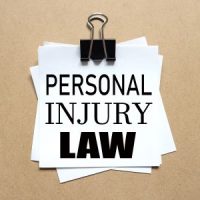What Is Personal Injury Law?

Personal injury law, or tort law as it is often called, is an area of the law that allows accident victims to file civil lawsuits against individuals or companies that cause them harm. Unlike criminal law, which requires a showing of guilt beyond a reasonable doubt, personal injury law requires that plaintiffs meet a lower standard, that of preponderance of the evidence. If able to establish that someone else caused their injury through negligent or reckless conduct, personal injury plaintiffs could receive financial remuneration in the form of a damages award.
Types of Personal Injury Cases
There are a lot of different types of personal injury cases, all of which involve establishing that someone’s negligence caused another person’s injury. The most commonly pursued types of personal injury claims involve:
- Car accidents, where one driver’s failure to obey the traffic laws or reckless conduct caused a collision;
- Truck accidents, which are often the result of truck driver or trucking company negligence;
- Slip and fall accidents, which occur when a property owner’s failure to keep his or her premises safe results in an injury after a visitor slips or trips and falls;
- Dog bites and animal attacks from dogs that were not properly restrained in public;
- Bicycle accidents, which often involve a cyclist being injured in a collision with a negligent driver, who failed to treat the cyclist as a legal road user;
- Motorcycle accidents, which involve collisions between passenger vehicles or trucks and much smaller motorcycles;
- Pedestrian accidents, which usually involve collisions with vehicles driven by motorists who violated a traffic law or were driving recklessly; and
- Accidents caused by defective consumer products.
Injured parties who can demonstrate a defendant’s fault for one of these kinds of accidents could be entitled to compensatory damages for their losses.
Personal Injury Damages
Unlike criminal cases, which if they result in a conviction, come with fines, jail time, and the creation of a criminal record, personal injury lawsuits require determining whether someone was negligent in a particular instance, and if so, what the injured party suffered in damages. Basically, the goal of personal injury lawsuits is to make victims whole, or to return them to their pre-accident state. To achieve this, negligent parties are not sentenced to jail or required to undergo other criminal penalties. Instead, they will be required to financially compensate the injured parties for economic losses, like medical expenses, lost wages, and property damage, as well as non-economic damages, which include reimbursement for emotional distress and pain and suffering.
Call a Fort Lauderdale Personal Injury Lawyer
Filing a civil lawsuit, like a personal injury claim can be complicated, requiring compliance with a host of procedural rules and deadlines, which is why it’s so important for accident victims to reach out to an experienced attorney before pursuing this type of claim. For an evaluation of the strengths of your own case, call 954-566-9919 and set up a free consultation with one of the dedicated Florida personal injury lawyers at Boone & Davis today.
Sources:
law.cornell.edu/wex/personal_injury
americanbar.org/groups/public_education/resources/law_issues_for_consumers/personalinjury/
